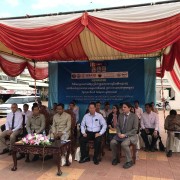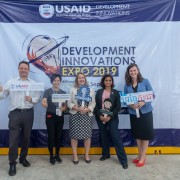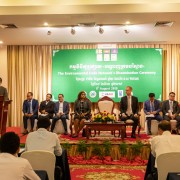Speeches Shim
USAID/Cambodia announced a major initiative to strengthen social accountability for public service delivery in urban areas of several Cambodian provinces. This effort, made up of several coordinated activities, will help citizens and authorities improve the availability and quality of services such as primary education, healthcare, waste collection, and administrative services.
USAID Cambodia supports health, education, and child protection programs to enable Cambodian children to access quality education, to grow up in safe, nurturing family environments free from violence, and to be healthy. Our work is guided by the U.S. government strategy of Advancing Protection and Care for Children in Adversity, which emphasizes the importance of strengthening the capacities of children, adolescents, and the families that care for them. This is one of the best investments a country can make to eliminate extreme poverty, boost economic growth, and promote a peaceful society.

Cambodia faces great challenges in preserving its rich fish populations. Water availability and timing are becoming increasingly uncertain here and throughout the Mekong Basin as hydroelectric development expands. Flooded forests are being removed. More people are fishing, both legally and illegally. And a changing climate adds uncertainty to all of these factors.
But I have also learned that Cambodians – both in government and in communities across the nation – are responding to these threats through community-based fishery management, improved law enforcement, and efforts to blend rice culture with aquaculture.

ICT applications are also being widely used by the public and private sectors in Cambodia for a broad range of purposes such as money transfers, digital payments, training, public outreach, data collection, transportation, and for other social and commercial purposes. There is really no facet of Cambodian life that has not been affected by ICT in some way or another.
That is why the United States has been a staunch supporter of ICT in Cambodia and in other countries. The reason is simple: we believe ICT can accelerate a country’s development, drive its economic success, and improve its prospects for self-reliance. We believe that digital technology should foster tools that empower citizens to make choices and have their voices heard and respected. Our belief in a free and fair system based on the rule of law underlines the United States’ approach to technology.

Cambodia’s economic security depends upon the sustainable management of natural resources and preserving a heathy environment. This is vital to the country’s continued economic growth. For the past three years, USAID and UNDP supported legal reforms to protect Cambodia’s environment, including amendments to the Protected Area law and the Forestry law. We also helped with the draft of the Environmental and Natural Resource Management Code of Cambodia. These amendments to the laws and the future enactment of the Environment Code establish a solid legal framework for the protection of natural resources.


Comment
Make a general inquiry or suggest an improvement.